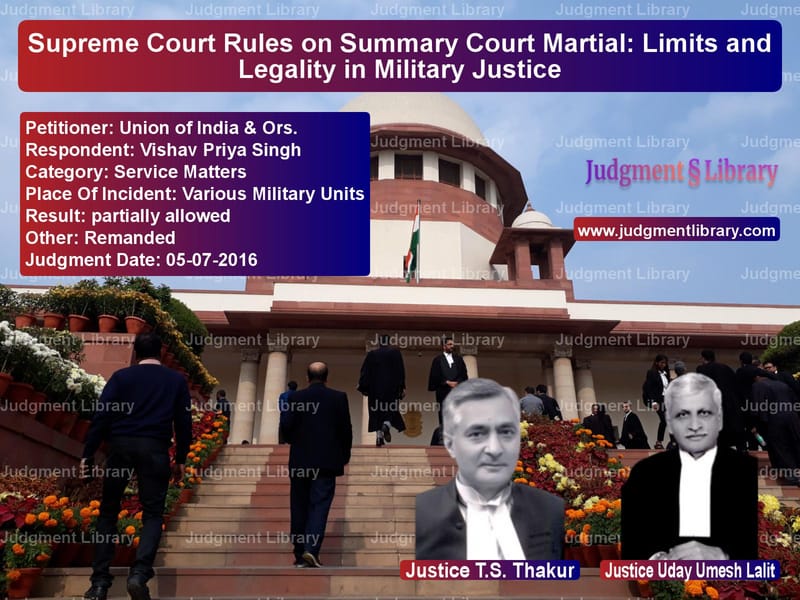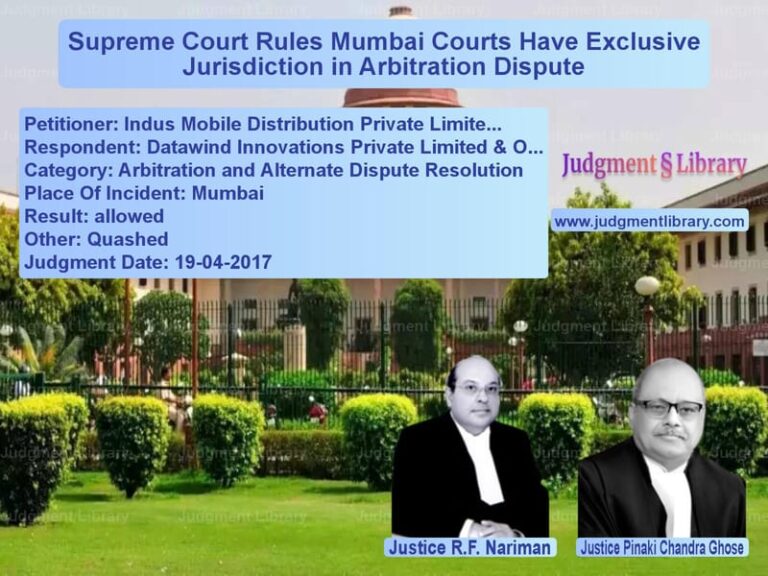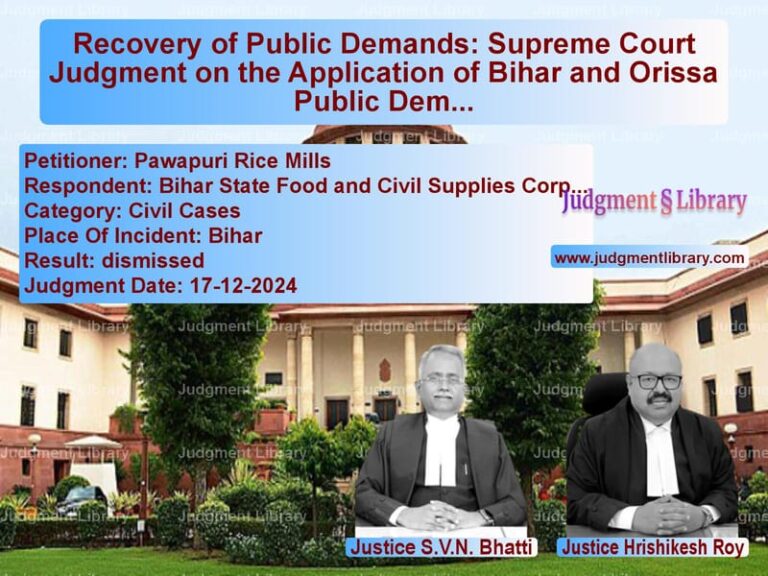Supreme Court Rules on Summary Court Martial: Limits and Legality in Military Justice
The case of Union of India & Ors. vs. Vishav Priya Singh and several related appeals addressed the legality and procedural fairness of Summary Court Martial (SCM) trials within the Indian Army. The Supreme Court reviewed multiple cases where soldiers had been tried by SCM and ruled on the scope, authority, and procedural limits of such courts, particularly when the commanding officer of a different unit conducted the trial.
Background of the Case
These cases arose from various petitions challenging the legality of SCM proceedings. The petitioners, all former members of the Indian Army, contended that their trials were unlawful because they were conducted by officers from units they were not originally part of. The High Court of Delhi and Rajasthan delivered different rulings on the issue, leading to appeals before the Supreme Court.
Legal Issues Raised
- Whether an SCM can be convened and completed by a Commanding Officer (CO) of a unit to which the accused was attached, rather than their original unit.
- Whether an SCM is an exceptional measure and should only be used under extraordinary circumstances.
- Whether procedural lapses in convening SCMs rendered the trials and punishments invalid.
Arguments of the Petitioners
The petitioners, all ex-servicemen, argued:
- That they were tried by an SCM convened by a CO who was not from their original unit, rendering the trial unlawful.
- That SCMs should only be used in emergencies, and their cases did not meet that criterion.
- That procedural violations, including the failure to document reasons for an SCM, invalidated their convictions.
- That the punishment imposed through SCM was disproportionate and arbitrary.
Arguments of the Respondents (Union of India)
The government argued:
- That under military law, a CO of a unit to which a soldier is attached has the authority to conduct an SCM.
- That SCMs are necessary for maintaining discipline in the armed forces.
- That the High Court of Rajasthan correctly upheld the SCM proceedings, while the High Court of Delhi wrongly ruled against them.
- That procedural lapses, if any, did not fundamentally affect the fairness of the trials.
Supreme Court’s Observations
The Supreme Court reviewed the relevant laws, including the Army Act, Army Rules, and past legal precedents. The Court held:
- That an SCM should be the exception, not the rule, and should only be held when immediate action is necessary.
- That the CO of a unit to which a soldier is attached can conduct an SCM under specific circumstances.
- That procedural fairness is a key requirement, and the necessity for an SCM must be documented and justified.
- That in cases where procedural lapses occurred, the SCM decisions could be subject to review.
Key Extracts from the Judgment
The Supreme Court ruled:
“An SCM can legitimately be convened where there is grave and compelling cause for taking immediate action, which would be defeated if reference to a District Court Martial or Summary General Court Martial is made. In other words, holding of an SCM is the exception and not the rule.”
The Court further observed:
“The decision to convene an SCM must be preceded by a reasoned order, which itself will be amenable to judicial review.”
Final Judgment
The Supreme Court made the following rulings:
- SCM trials should not be routinely used but should be reserved for cases requiring immediate disciplinary action.
- The High Court of Delhi erred in concluding that only the CO of a soldier’s original unit could conduct an SCM.
- The appeals from the Union of India were allowed, and the matters were remitted back to the High Court for reconsideration on merits.
- The appeals from the Rajasthan High Court were dismissed, as the SCM convictions in those cases were upheld.
Impact of the Judgment
This ruling has several implications:
- It clarifies the scope of SCMs and limits their arbitrary use.
- It establishes the procedural necessity of recording reasons before convening an SCM.
- It ensures that soldiers have greater legal protections in military trials.
- It reinforces the principle that military discipline must be balanced with fairness and due process.
Conclusion
The Supreme Court’s decision in Union of India vs. Vishav Priya Singh and related appeals serves as an important precedent in military law. By setting clear guidelines on when and how an SCM can be conducted, the Court has strengthened procedural safeguards for members of the armed forces. This ruling underscores the principle that justice, even in military settings, must be administered with fairness and due process.
Don’t miss out on the full details! Download the complete judgment in PDF format below and gain valuable insights instantly!
Download Judgment: Union of India & Ors vs Vishav Priya Singh Supreme Court of India Judgment Dated 05-07-2016-1741873090380.pdf
Direct Downlaod Judgment: Direct downlaod this Judgment
See all petitions in Disciplinary Proceedings
See all petitions in Judgment by T.S. Thakur
See all petitions in Judgment by Uday Umesh Lalit
See all petitions in partially allowed
See all petitions in Remanded
See all petitions in supreme court of India judgments July 2016
See all petitions in 2016 judgments
See all posts in Service Matters Category
See all allowed petitions in Service Matters Category
See all Dismissed petitions in Service Matters Category
See all partially allowed petitions in Service Matters Category







